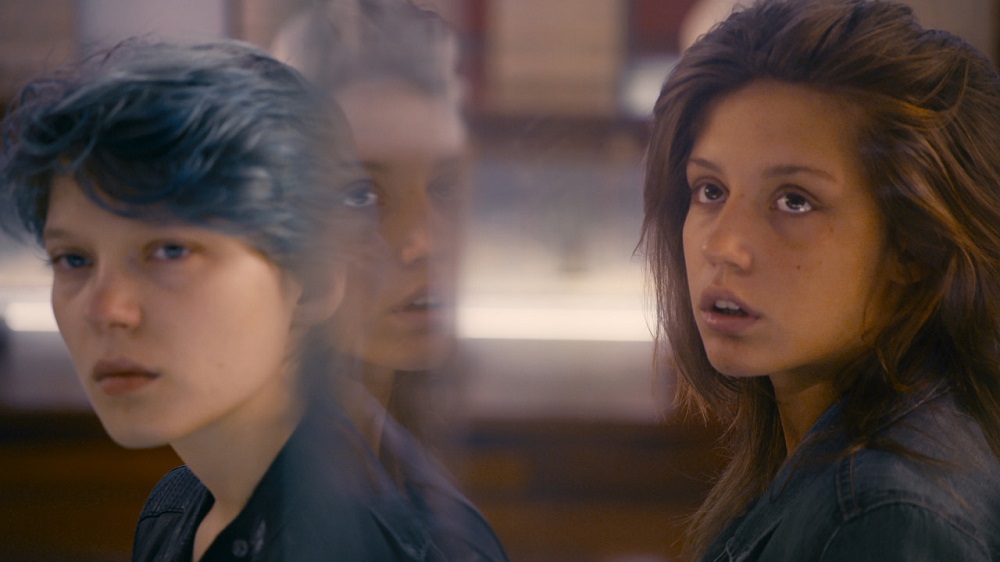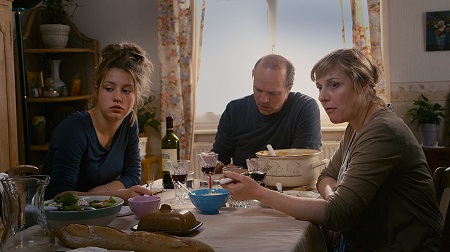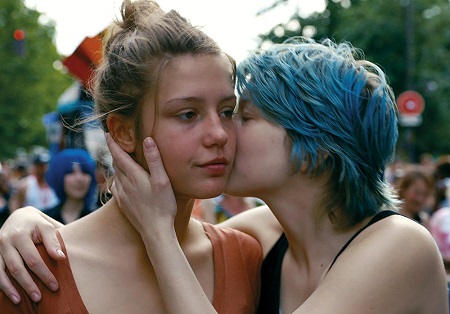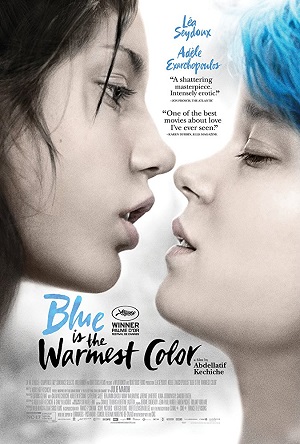
Blue is the Warmest Color (2013)
by Sara Michelle Fetters - November 20th, 2013 - Four-Star Corner Movie Reviews
Heartrending Blue an Enthralling Sojourn of Love and Loss
“How do you understand that the heart is missing something?”
So asks a teacher early on in the sprawling coming of age romance Blue is the Warmest Color (La Vie d’Adèle), and it is the pivotal question that runs through virtually every frame of director Abdellatif Kechiche’s (The Secret of the Grain) prize-winning epic. It is the central query around which everything else will revolve, and while finding a definitive answer is impossible, trying to do so still proves to be an adventure worth taking for heroine Adèle (Adèle Exarchopolous).
She is 15, dreams of romance drifting through her mind at any given moment. When she meets blue-haired art student Emma (Léa Seydoux) fantasy begins to become reality, the slightly older girl taking her on a journey of passion, sex and longing she never could have imagined before their meeting. Theirs is a connection neither was prepared for, the pair’s embraces having an influence on their young lives that will be felt for many years to come.
As far as I can tell this is as loose an adaptation of any piece of source material in all of 2013 this side of World War Z, the film based on the Gallic graphic novel by Julie Maroh. Director and co-screenwriter Kechiche, working again with Black Venus collaborator Ghalia Lacroix, isn’t interested in genre tropes or melodrama staples. He eschews easy categorization, playing with stereotypes and clichés in bold, vibrant ways that make even the most routine of coming-of-age redundancies feel fresh and new. His film spirits around Adèle and Emma’s relationship with spry, imaginative ingenuity, passion and pain handled with unflinching specificity that makes all that’s taking place hit home in bracingly authentic fashion.
There were times I felt like I was watching some amalgam of an early John Cassavetes’s drama melded with the unflinching European sensibilities of say an Erick Zonca or brothers Jean-Pierre and Luc Dardenne, Kechiche’s bold attention to detail and documentary-like focus extraordinary. Even at nearly three hours, his film is never out of sorts or unfocused, and while certain tangents have the initial aura of being inconsequential, the filmmaker continually connects all the dots, giving things a ruthless eloquence difficult to describe and even harder to dismiss.
None of which would matter if the actors in charge of bringing all of these emotional gradations to life weren’t up to the challenge presented them, and to say the luminous Seydoux and the astonishing Exarchopolous rise to the occasion vastly understates their accomplishments. For the former, while she’s managed to make an indelible imprint on a number of features ranging from a Hollywood action sequel (Mission: Impossible – Ghost Protocol), to a Woody Allen treasure (Midnight in Paris), to an immaculate French period pieces (Farewell, My Queen), she goes way beyond anything I’ve seen her do before portraying Emma, this passionate creature of happenstance and chance never what she appears to be. This is a rich depiction of carnal longing and festering physical need that is as explosive as it is bewitching, Seydoux neither hero or villain, the woman just a fellow traveler on life’s ever-winding road seeking love and togetherness just like everyone else.
As magnificent as she is, and she is brilliant, Seydoux is nothing in comparison to 19-year-old newcomer Exarchopolous. It’s hard to appropriately describe just how glorious the actress is, how deep she travels down Adèle’s labyrinthine path. Calling her work the performance of the year would still not quite speak to just how mind-blowing she is. This is her journey, her enlightenment, the pitfalls and perils, the triumphs and jubilations, all of it and more comes into play as our young heroine experiences her sexual awakening. Not a moment feels artificial and not a look is out of place, each beat of her performance a carefully calibrated waltz of growth and illumination that’s as precise as it is profound.
Much has been made of the sex scenes. They are as explicit as advertised, and while their length can feel excessive there is still nothing puerile or exploitive about what is going on or how it is being depicted. Yes, some viewers will be titillated, finding some sort of voyeuristic excitement in watching Seydoux and Exarchopolous physically express their desires. But chances are if they let their hormones get the best of them they might not notice just how deftly the actresses keep these sequences focused upon the characters and their emotional growth above everything else, showing in stunning fashion how sex and love can blossom into one and the same thing frequently at the most unexpected of moments.
I’m not classifying Blue is the Warmest Color as some sort of “coming out” movie. It isn’t a “lesbian melodrama” in the strictest sense. Kechiche’s film is interested in the human condition on a much grander scale, so trying to pigeonhole it one way or another does both it and the audience watching a grave disservice. Everything, start to finish, constantly and with propulsive magnetism, keeps leading back to that initial question, the heart and its mysterious, virtually unfathomable longings revealing a tale of growth, desire, understanding, lust and, yes, love that can be intimately understood orientation, gender, race and all the rest notwithstanding.
– Review reprinted courtesy of the SGN in Seattle
Film Rating: 4 (out of 4)







